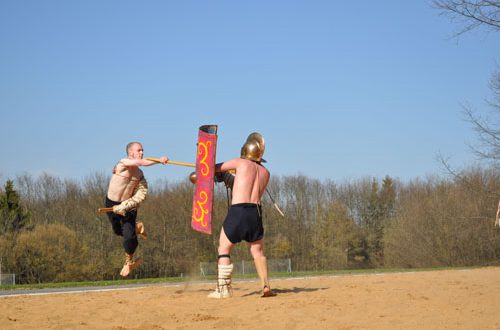 So despite objections from campaign groups such as MediaWatch UK, it now looks as though British viewers will be able to watch the new TV series Spartacus: Blood and Sandafter all.
So despite objections from campaign groups such as MediaWatch UK, it now looks as though British viewers will be able to watch the new TV series Spartacus: Blood and Sandafter all.
Pay-TV channel Bravo, owned by Virgin Media, has bought the rights to the first two series and is planning to air the 13-part series this summer the dates are still to be confirmed.
The show, which was broadcast by Starz Network in the US, has raised a few eyebrows with its graphic violence, scenes of orgies and ‘full-frontal’ nudity.
So British viewers are certainly in for an eye-full this summer. You only need to see the trailer (below) to see that Starz (also the series’ producers) have got that blood-squirting special effect down to a very fine art.
The Gore Factor
But there’s been some debate about the wisdom of screening something so explicit on television particularly since, even if it’s screened after the 9pm watershed, there are concerns it could be watched on digital boxes after the screening, and that children will be able to see it easily.
The gore and explicit sex is probably aimed solely at scoring high viewer ratings rather than an attempt at historical authenticity. And for all our protests and qualms about sensationalist soft-porn creeping onto our screens, it’s likely that viewing figures for Spartacus: Blood and Sand will be high. Similar shows, such as HBO’s Rome, broadcast in the UK on BBC2, had viewing figures (when it was first broadcast in 2005) of 3 million or 13 per cent of the population, according to Broadcast magazine. While the sexy historical drama The Tudors (on BBC2 in the UK) was also netting an audience of well over 2 million in 2009. Spartacus, with the hype surrounding its high blood and sex content, could reel in even higher figures.
Were Romans Really That Sex-Mad?
But while these historical dramas are liberal with the historical facts as well as with their characters’ love affairs, perhaps they manage to sum up the spirit of the ages they portray far better than more straight-laced (but factual) productions. According to one academic, Roman contemporary writers made a lot of references to sexual exploits and violence and they are known for having a far more open attitude to sex than modern audiences. A classics professor at Birkbeck, University of London, Catherine Edwards, told the Telegraph: We do find Roman writers going on at great length about the terrible sexual excesses of their peers, or else castigating the Roman plebs for spending too much time watching gladiator fights.
The Romans during the first century BC (Spartacus’s rebellion lasted from 73-71 BC and the first two series of Rome span 49-31 BC) were beyond doubt far more liberal, physical and violent than we are today. Between 18-17 BC, Augustus tried to calm what he saw as the immoral behaviour in Rome by issuing his pro-family and anti-adultery laws, part of his Lex Julia. It was also a pagan age, before Christianity took hold and spread its message of virtue and restraint. So it’s quite likely that the Romans of the first century BC felt far fewer constraints or inhibitions when it came to physical conflict or sex.
Where is the Gore (and ‘Phwoar’) Factor Today?
Perhaps in watching the Romans frolicking in Spartacus: Sand and Blood, we realise how many inhibitions and constraints we have these days. There are endless good reasons why we’d choose not to fight or sleep around: diseases, guns, the police, disapproval, preference or some might say even a lack of opportunity. Some of these existed in Roman times, some didn’t.
So do we wish we were back in that state of ‘freedom’, able to settle disagreements with a battle rather than in court, and free to be as promiscuous as we like without having to think about the consequences, condoms, paternity tests, STDS or the huge social upset that affairs cause these days (you don’t have to scratch your head too hard to think of a celebrity castigated for having a fling or two there’s John Terry, Tiger Woods and now shock horror Mark Owen from Take That).
Adulterous ancient Romans before 18 BC certainly weren’t subject to the same level of social disapproval (perhaps the prevalence of marriages made for power and status, not love, had something to do with this). Maybe this is a more natural state of things for human beings and one we have hankerings for. It might be no wonder we want some escapism from the high-pressured lives we lead where marriages that don’t last forever are branded failures and celebrities who cheat on their partners are demonized by the press.
Our Animal Instinct
 Apart from the free and open attitude to sex, Spartacus is a production based heavily on combat scenes inside and outside the arena. With the afore-mentioned blood-squirting special effects, these scenes aren’t pretty and could make even a professional butcher feel slightly sick.
Apart from the free and open attitude to sex, Spartacus is a production based heavily on combat scenes inside and outside the arena. With the afore-mentioned blood-squirting special effects, these scenes aren’t pretty and could make even a professional butcher feel slightly sick.
It’s true that the ancients led far gorier and bloodier lives than we do. They killed their own animals for eating, and would have been used to deaths by childbirth, fighting, execution and injury. In contrast, people in the west today live a step removed from most of this we have hospitals to deal with the sick and with birth, supermarkets to prepare and pre-package our (pre-washed) food and police or law courts to settle disputes.
Perhaps it’s the sanitation, order and lack of risk in most people’s lives that means they are titillated by the blood and sex of shows like Spartacus or Rome. These shows, very much like the mixture of stories on grizzly crimes and celebrity love lives found in tabloids, pander to what seems to be an insatiable public thirst for images of sex and violence together if at all possible. It’s a dark, animal side to human nature that we might like to think we’ve evolved away from. The viewing figures for Spartacus might suggest otherwise.





